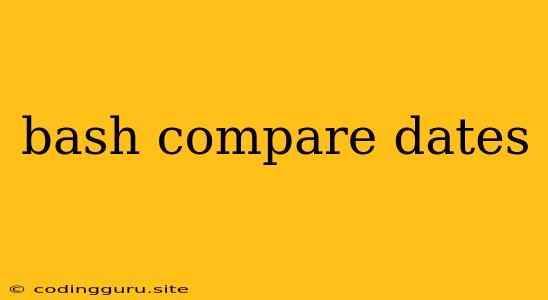Comparing Dates in Bash: A Guide to Mastering Time Management
In the world of scripting and automation, working with dates is a common requirement. Bash, the ubiquitous shell for Unix-like systems, offers powerful tools for comparing dates, enabling you to build robust scripts that handle time-sensitive tasks. Let's dive into the realm of date manipulation in Bash and explore the techniques for comparing dates effectively.
Why is Comparing Dates Important?
Understanding how to compare dates in Bash is crucial for various reasons:
- Scheduling tasks: You might need to execute commands or scripts at specific times or based on time intervals.
- File management: You can filter files based on their modification or creation dates.
- Log analysis: Extracting data from log files based on timestamps is a common requirement.
- Data processing: Sorting and filtering data based on date values is a fundamental operation.
Essential Tools for Date Comparison
Bash provides a core set of tools for working with dates. Let's break down the key players:
-
dateCommand: The cornerstone of date manipulation in Bash, thedatecommand allows you to format, retrieve, and modify dates. -
date +%s: This format specifier retrieves the date and time as a Unix timestamp (seconds since the Unix epoch). Timestamps are numeric representations of dates, making them ideal for comparison. -
Comparison Operators: Bash provides standard comparison operators like
-eq(equal),-ne(not equal),-gt(greater than),-lt(less than),-ge(greater than or equal to), and-le(less than or equal to).
Comparing Dates in Bash: Practical Examples
Let's illustrate how to compare dates using Bash:
1. Comparing Timestamps
# Get timestamps for today and yesterday
today_timestamp=$(date +%s)
yesterday_timestamp=$(date -d 'yesterday' +%s)
# Compare the timestamps
if [ $today_timestamp -gt $yesterday_timestamp ]; then
echo "Today's timestamp is greater than yesterday's"
else
echo "Today's timestamp is not greater than yesterday's"
fi
2. Comparing Dates with Specific Formats
# Define dates in a custom format (e.g., YYYY-MM-DD)
date1="2023-12-25"
date2="2024-01-01"
# Convert dates to timestamps using the `date` command
timestamp1=$(date -d "$date1" +%s)
timestamp2=$(date -d "$date2" +%s)
# Compare the timestamps
if [ $timestamp1 -lt $timestamp2 ]; then
echo "Date 1 is earlier than Date 2"
else
echo "Date 1 is not earlier than Date 2"
fi
3. Comparing Dates with date +%Y%m%d
# Get today's date in YYYYMMDD format
today_date=$(date +%Y%m%d)
# Define a target date
target_date="20240115"
# Compare the dates
if [ $today_date -gt $target_date ]; then
echo "Today's date is later than the target date"
else
echo "Today's date is not later than the target date"
fi
4. Using date -d for Flexibility
# Compare today's date with 10 days ago
today_date=$(date +%Y-%m-%d)
ten_days_ago=$(date -d '10 days ago' +%Y-%m-%d)
if [ "$today_date" -gt "$ten_days_ago" ]; then
echo "Today is later than 10 days ago"
fi
5. Combining Comparison and File Operations
# Find files modified in the last 24 hours
find . -type f -mtime -1 -print
This command uses find to search for files (-type f), with modification times (-mtime) less than 1 day (-1), and prints their names.
Best Practices for Date Comparison in Bash
- Consistency: Use a consistent date format throughout your script.
- Timestamp Conversion: For complex comparisons, convert dates to timestamps for accurate results.
- Error Handling: Handle potential errors in date conversions or comparisons.
- Readability: Employ clear variable names and comments to enhance code maintainability.
Conclusion
Comparing dates in Bash is a fundamental skill for scripting and automation. By leveraging the powerful tools provided by the date command and the Bash comparison operators, you can write scripts that handle time-sensitive tasks, analyze logs, and manage files effectively. Remember to choose the appropriate methods based on your specific needs and to follow best practices for clean and reliable date comparisons.
